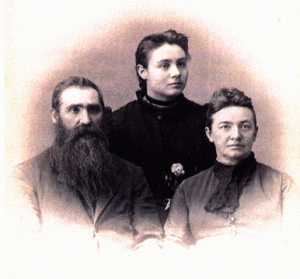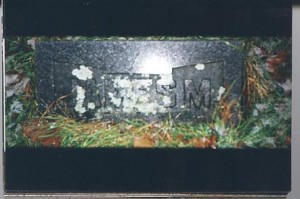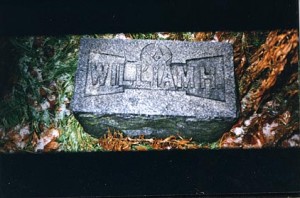from pages 80-81 & 82 of “Bolivar, N.Y. Pioneer Oil Town” by: John P. Herrick, The Ward Ritchie Press Los Angeles, Cal. 1952
Of the many oil region stories told to the writer, none surpasses in human interest that of William H. Merritt, for many years a resident of the town of Genesee, Allegany County, New York0 A veteran of the Civil War, he was a farmer, an oil producer, poet laureàte of the New York’s Allegheny County – one who “lived in a house by the side of the road and was a friend of man.” And he proved that poets can succeed in business, when, in 1919, he exchanged his oil properties for one hundred thousand dollars.
His diversions were writing verse, playing the violin, attending Grand Army and Masonic reunions, oil producers meet ings State Oil Producer’s breeding Shetland ponies. His brother James, mentally ill, lived with him for some years on the home farm. Neighbors hinted that James should be placed in an institution, but they did not know that a pledge, stronger than steel, bound the brothers, one to the other.
When President Lincoln called for volunteers, William and James journeyed to the home of their brother, Welcome Merritt, in Orange County, New York. The three had agreed by letter to enlist in the same company, but Welcome, due to injuries suffered in a hunting accident, was rejected. William and James enlisted in the Orange Blossoms, as the Orange County Regiment was known throughout the war. On enlistment day they made a solemn vow that, “as long as grass grows and water runs,” come what may, they would never be separated. At the battle of Antietam, fighting side by side, Wil1iam was seriously wounded, and James carried him off the field on his back. Weeks passed before William left the hospital to rejoin his brother in camp.n the fierce fighting in which their company engaged above rock-strewn Devil’s Den at Gettysburg, the brothers were parted all day, but found each other at dusk. In searching among the dead and wounded for his missing brother that afternoon, William turned over a body he felt certain was that of James- the bearded faces were so alike – but he was mistaken. The dead man was an officer, whose sword and scabbard were taken by William and retained as war mementos.
Only three members of their company stacked guns at the rendezvous that night, so desperate had been the fighting and so heavy the toll. The third member was their tentmate, John Tucker, who years after the war, resided in the Bradford oil fields, in Pennsylvania. William twice declined promotion because it meant separation from his brother, and made entries in a diary each night, expressing gratitude to God for the preservation of their lives.
from: Bolivar, New York’s “Pioneer Oil Town” by:J.P. Herrick
William was aware of the criticism for keeping his brother at his home, but he never explained his actions, except to one close friend. He felt that he must keep inviolate his solemn pledge to James, who had braved shellfire to carry his wounded body to a zone of safety. And it was impossible for James in his mental condition, to release him from their vow.
A devoted sister, Lydia Jane Merritt, who managed the farm home for many years, knew of the bond that linked her brothers and agreed that it should continue so long as James lived. Miss Lydia lightened all the burdens of their household and played the organ accompaniment to her brother’s violin.
There came a day when William was seriously injured in a trolley wreck, and it was feared that he might never walk again. The news of the accident was at first kept from James but later he was gently told by his brother Welcome. “That is too bad, I am just a burden to William,” he said.
All day he was restless and depressed. That night the Angel of Death swooped low over the farmhouse on the hillside and wafted away the spirit of the demented brother, sundering the vow of fidelity to their pledged word. William recovered from his injuries and lived to be 86.
In the century-old cemetery at Little Genesee, New York, not far from a transcontinental highway, side by side, there are two graves. Over these mounds spring flowers bloom, summer winds whisper, autumn leaves fall, and winter snows drift – and new flags wave on each Memorial Day. The flags mark the graves of William and James Merritt, brothers and comrades in arms, faithful to their pledged word in life reunited in death.




I am a relative of William Merritt…. my great great great grandfather, George Washington Maryatt, being William’s oldest brother. Just wonderful to have this level of detail about my ancester, especially from an important and famous regiment as the 124th New York. I leave my e-mail below in the event someone wishes to share more information about this fascinating man.